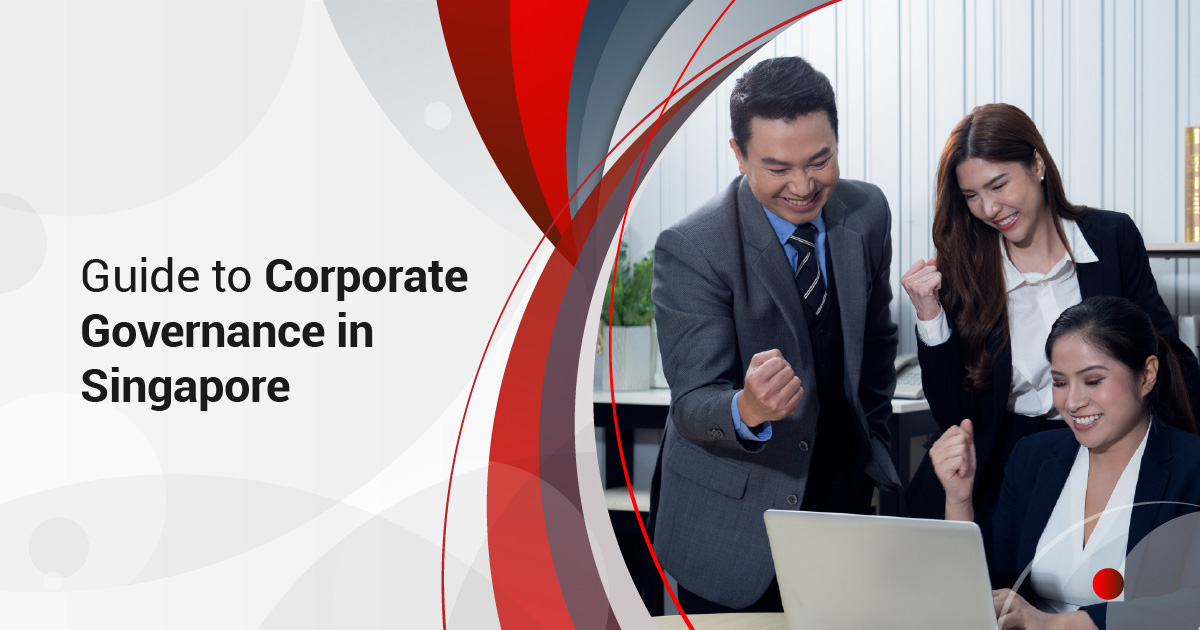Singapore’s status as Asia’s most trusted business hub rests on a foundation that many companies overlook until they face a penalty notice from the Accounting and Corporate Regulatory Authority (ACRA) or struggle with board compliance requirements.
The governance framework here operates through multiple regulatory layers that demand both statutory adherence and strategic judgment – miss either element and your company risks fines, director disqualification, or damaged investor confidence.
To illustrate the stringent nature of corporate governance requirements, Singapore regulatory bodies issued penalties totalling S$27.45 million to nine financial institutions in July 2025 alone for governance failures. The costs then almost invariably extend beyond financial penalties: directors face personal liability, companies lose market credibility, and foreign investors question management capability.

The challenge lies in Singapore’s distinctive hybrid system. The Companies Act provides rigid statutory requirements that apply universally, whilst the Code of Corporate Governance operates on a “comply or explain” basis that demands thoughtful justification for any deviation. Understanding which rules are absolute and which allow flexibility separates compliant companies from those caught unprepared.
This article breaks down what actually matters in Singapore’s corporate governance framework – the regulatory structure you must work within, the board composition rules you cannot ignore, the committee requirements that affect daily operations, and the compliance obligations that protect your business.
Whether you are establishing operations or reviewing current practices, these are the specific requirements that determine success or expose your company to regulatory action.
Key Takeaways
- Singapore’s governance framework combines rigid statutory requirements under the Companies Act with the flexible “comply or explain” approach of the Code of Corporate
- Governance, ensuring both legal certainty and adaptability.
- Three key bodies, ACRA, MAS, and SGX, enforce compliance through escalating penalties, from financial fines to director disqualification and criminal prosecution.
- Listed companies must meet strict board independence requirements, including a minimum of one-third independent directors and mandatory separation of Chairman and CEO roles.
- Non-compliance can result in severe consequences, including fines, director liability, and loss of investor confidence, emphasising the need for dedicated governance expertise.
- InCorp provides end-to-end corporate secretarial services, ensuring compliance with Singapore’s complex governance requirements while allowing businesses to focus on growth.
Singapore’s Governance Framework Structure

The Dual-System Approach
The Companies Act, established in 1967, sets non-negotiable requirements for every company, from incorporation through dissolution. The Securities and Futures Act adds provisions for listed entities. Both create legal certainty that investors demand.
The Code of Corporate Governance works differently. Its “comply or explain” mechanism lets companies deviate from provisions if they justify how alternatives achieve the same principle. This prevents rigid rules from stifling innovation or burdening smaller companies. The combination attracts capital while maintaining high standards.
Three Regulatory Bodies
- ACRA oversees all business entities, enforces the Companies Act, and manages company registrations.
- MAS regulates financial institutions and listed company governance whilst issuing Code revisions.
- SGX operates as a frontline market regulator through its Listing Manual. This creates escalating enforcement: SGX handles initial breaches, courts enforce serious cases, and statutory violations trigger MAS prosecution. The system combines market agility with state authority.
| Regulator | Primary Mandate | Key Responsibilities | Primary Enforcement Powers |
|---|---|---|---|
| ACRA | National regulator of business entities, public accountants, and corporate service providers. | Administers the Companies Act; oversees company registration and compliance; sets accounting and auditing standards. | Financial penalties for non-compliance with the Companies Act, disqualification of directors, and striking off companies. |
| MAS | Central bank and integrated financial regulator. | Regulates financial institutions; oversees corporate governance of listed companies; issues and revises the Code of Corporate Governance. | Fines, revocation of licenses, prohibition orders, and criminal prosecution. |
| SGX | Frontline regulator for the securities market. | Enforces listing rules via the Listing Manual; prescribes disclosure obligations and regulates interested person transactions. | Fines up to S$250,000 per contravention; can apply to courts for enforcement orders. |
Statutory Requirements
Companies Act Obligations
Section 157 of the Companies Act requires directors to act honestly and use reasonable diligence. Misuse of position or company information for personal gain attracts personal liability – be warned that directors pay these penalties themselves, not the company.
Specific duties include:
- Maintain proper accounting records
- Present financials at AGMs
- Appoint a company secretary within three months of incorporation
- Pay dividends only from profits.
- Disclosure of personal conflicts is mandatory. False statements in company documents trigger fines up to S$50,000 and two years’ imprisonment. ACRA prosecutes these violations.
Listed Company Requirements
The Securities and Futures Act elevates listing rule breaches to criminal offences. Intentional or reckless disclosure failures become prosecutable violations, and even negligent failures carry civil penalties and liabilities.
SGX Listing Manual requirements include:
- Continuous disclosure
- Interested person transaction rules
- Prospectus standards
- Director shareholding disclosures.
If you miss a disclosure deadline, you will likely face SGX sanctions and potential MAS prosecution. This dual system explains why listed companies operate under stricter scrutiny than private entities.
Related Read: How Can Startups Benefit From Outsourcing to a Corporate Secretarial Service Provider in Singapore?
Board Composition and Structure

Independence Requirements
Listed companies need at least two independent non-executive directors, and one-third of the board must be independent, and the majority of the board if the chairman is not independent.
Directors lose independent status after 9 years on the board, if employed by the company within three years, or if immediate family hold senior positions. The 2012 Code revision requires independence from shareholders holding over 10% of shares – a shift targeting Singapore’s concentrated ownership structures where controlling shareholders, not management, pose the real governance risk.
Leadership Structure
The Chairman and CEO must be separate individuals. There are no exceptions to this rule. The chairman runs board effectiveness and promotes open debate. Boards need diversity policies covering skills, experience, gender, and age, with progress disclosed annually. Women now hold 25.1% of board seats, more than three times the representation 10 years ago. The 9-year director tenure cap has accelerated this shift by opening board positions.
Board Committees and Oversight
Mandatory Committees
All listed companies must establish three committees: Audit, Remuneration, and Nominating. Each needs written terms of reference.
- Audit Committee: minimum three non-executive directors, majority independent, including the chair. At least two members (including the chair) must have recent accounting or financial management expertise.
- Remuneration Committee: minimum three non-executive directors, majority independent, including the chair.
- Nominating Committee: minimum three directors, majority independent, including the chair.
Committee Functions
The Audit Committee oversees financial reporting integrity, reviews external audit scope and results, and assesses auditor independence. Must meet external and internal auditors without management present annually.
The Remuneration Committee sets director and CEO compensation packages, and recommends remuneration frameworks linking pay to performance.
The Nominating Committee handles director appointments, determines annual independence assessments, and manages succession planning. Reviews each director’s contribution, attendance, and participation before re-nomination recommendations.
Financial Reporting and Accountability
Reporting Requirements
All Singapore companies must prepare annual financial statements and file them with ACRA in eXtensible Business Reporting Language (XBRL) format. Balance sheet, income statement, and cash flow statement form the core components.
Audit requirements apply if companies meet two of three conditions for two consecutive years: total assets exceeding S$10 million, annual revenue exceeding S$10 million, or more than 50 employees. Public companies must present their financial statements at AGMs.
Risk Management and Internal Controls
Boards hold ultimate responsibility for risk governance. Annual reviews of internal control adequacy are mandatory, covering financial, operational, compliance, and IT risks.
Annual reports must describe principal risks and management approaches. Boards should confirm receipt of the CEO and CFO assurance statements on financial record accuracy and risk management system effectiveness. This creates direct executive accountability for control failures.
Where to Next With InCorp
Singapore’s governance complexity demands dedicated expertise. Even established local companies lack internal resources for full compliance execution. MNEs operating in Singapore face sharper challenges: unfamiliar regulations, local compliance nuances, and stretched resources across multiple jurisdictions.
InCorp’s corporate secretarial services take care of it all: ACRA filing management, board meeting administration, annual return preparation, minute-taking, and regulatory monitoring. We track changes so compliance risks don’t catch you unprepared. Contact InCorp to handle governance requirements while you focus on business growth. Our specialists manage the compliance burden you cannot afford to get wrong.
FAQs about Corporate Governance in Singapore
What are Singapore's corporate governance requirements?
- Companies Act compliance is universal: directors act honestly with reasonable diligence, maintain proper accounts, file annual returns with ACRA. Listed companies face Securities and Futures Act requirements plus SGX Listing Manual rules – board independence minimums, three mandatory committees, continuous disclosure. Miss any requirement and penalties follow.
What penalties do directors face for governance breaches in Singapore?
- Personal liability. False company statements: S$50,000 fines and two years' imprisonment. ACRA disqualifies directors for persistent breaches. Listed company directors face SGX sanctions plus MAS criminal prosecution for disclosure failures. Recent enforcement: S$27.45 million in penalties across nine institutions in July 2025 alone.
Do Singapore companies need corporate secretarial services?
- Not legally mandatory but practically necessary. ACRA filing, board minutes, annual returns, regulatory monitoring – most companies lack internal capability. One missed deadline triggers penalties. MNEs face sharper challenges with unfamiliar Singapore requirements. InCorp handles the full compliance burden.


